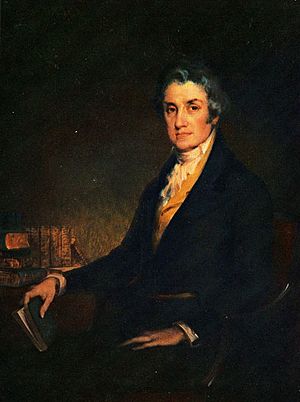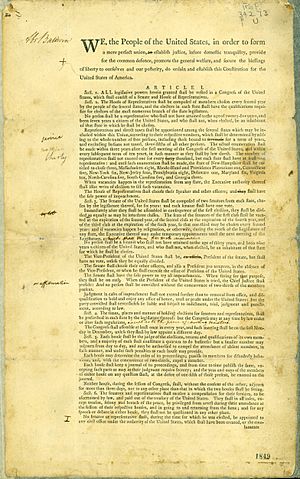Abraham Baldwin facts for kids
Quick facts for kids
Abraham Baldwin
|
|
|---|---|
 |
|
| President pro tempore of the United States Senate | |
| In office December 7, 1801 – December 13, 1802 |
|
| Preceded by | James Hillhouse |
| Succeeded by | Stephen R. Bradley |
| United States Senator from Georgia |
|
| In office March 4, 1799 – March 4, 1807 |
|
| Preceded by | Josiah Tattnall (politician) |
| Succeeded by | George Jones |
| Member of the U.S. House of Representatives from Georgia's at-large district |
|
| In office March 4, 1793 – March 3, 1799 |
|
| Preceded by | district created |
| Succeeded by | James Jones |
| Member of the U.S. House of Representatives from Georgia's 2nd district |
|
| In office March 4, 1789 – March 3, 1793 |
|
| Preceded by | district created |
| Succeeded by | Converted to at-large districts |
| President of the University of Georgia | |
| In office 1785–1801 |
|
| Preceded by | None; post established |
| Succeeded by | Josiah Meigs |
| Delegate from Georgia to the Congress of the Confederation | |
| In office 1785 – 85, 1787–88 |
|
| Personal details | |
| Born | November 22, 1754 Guilford, Connecticut Colony, British America |
| Died | March 4, 1807 (aged 52) Washington, D.C., U.S. |
| Resting place | Rock Creek Cemetery Washington, D.C., U.S. |
| Alma mater | Yale College |
Abraham Baldwin (November 22, 1754 – March 4, 1807) was an important American leader. He was a Patriot during the Revolutionary War. He also became a politician and a Founding Father.
Baldwin is famous for signing the United States Constitution. He was born in Connecticut and went to Yale College. After the war, he became a lawyer. He moved to Georgia in the 1780s. There, he helped start the University of Georgia.
Abraham Baldwin served as a United States Senator for Georgia from 1799 to 1807. During this time, he was also the President pro tempore of the United States Senate from 1801 to 1802.
Early Life and Education
Abraham Baldwin was born in 1754 in Guilford, Connecticut. He grew up in a big family. His father, Michael Baldwin, was a blacksmith. Abraham went to Guilford Grammar School.
Later, he attended Yale College in New Haven, Connecticut. He graduated from Yale in 1772. Three years later, he became a Congregationalist minister. He also worked as a tutor at Yale until 1779.
During the American Revolutionary War, Baldwin served as a chaplain for the Continental Army. He did not fight in battles. After the war, he decided to study law instead of becoming a professor. He became a lawyer in 1783.
Moving to Georgia
General Nathanael Greene, a former commander, encouraged Baldwin to move to Georgia. Governor Lyman Hall, who also went to Yale, asked Baldwin to help create a state education plan.
Baldwin became the first president of the University of Georgia. He worked hard in politics to get support for the new university. He was chosen to be a delegate to the Congress of the Confederation. Then, he went to the Constitutional Convention. In September 1787, he signed the U.S. Constitution for Georgia.
Baldwin remained president of the University of Georgia until 1800. He helped create the college's rules. In 1801, Franklin College, the first part of the University of Georgia, opened. The first buildings looked like Yale, where Baldwin had studied and taught.
Political Career
Baldwin was elected to the Georgia Assembly. He worked hard to get support for the new college. He was good at bringing together different groups of people. This included frontiersmen and wealthy planters.
He became a very important lawmaker. He helped pass major laws, like the education bill. In 1788, he was elected to the U.S. Congress.
The Georgia legislature chose him as a U.S. Senator in 1799. (Back then, state lawmakers chose senators, not voters.) He served as President pro tempore of the United States Senate from December 1801 to December 1802. He was re-elected and served until he passed away.
His Legacy
Abraham Baldwin died on March 4, 1807, when he was 52 years old. He was still serving as a U.S. Senator for Georgia. A newspaper in Washington, D.C., wrote about him. It said he created the idea for the University of Georgia. It also said he worked hard to get the state assembly to approve it. He is buried at Rock Creek Cemetery in Washington, D.C.
Many things are named after him:
- The United States Postal Service made a 7¢ postage stamp in his honor.
- Baldwin County in Alabama and Georgia are named for him.
- Abraham Baldwin Agricultural College in Tifton, Georgia is named after him.
- Abraham Baldwin Middle School in Guilford, Connecticut is also named for him.
- There are Baldwin streets in Madison, Wisconsin and Athens, Georgia.
- The University of Georgia has a statue of Baldwin on its campus. It honors him as the university's founding father.
See also
 In Spanish: Abraham Baldwin para niños
In Spanish: Abraham Baldwin para niños
 | Georgia Louise Harris Brown |
 | Julian Abele |
 | Norma Merrick Sklarek |
 | William Sidney Pittman |


